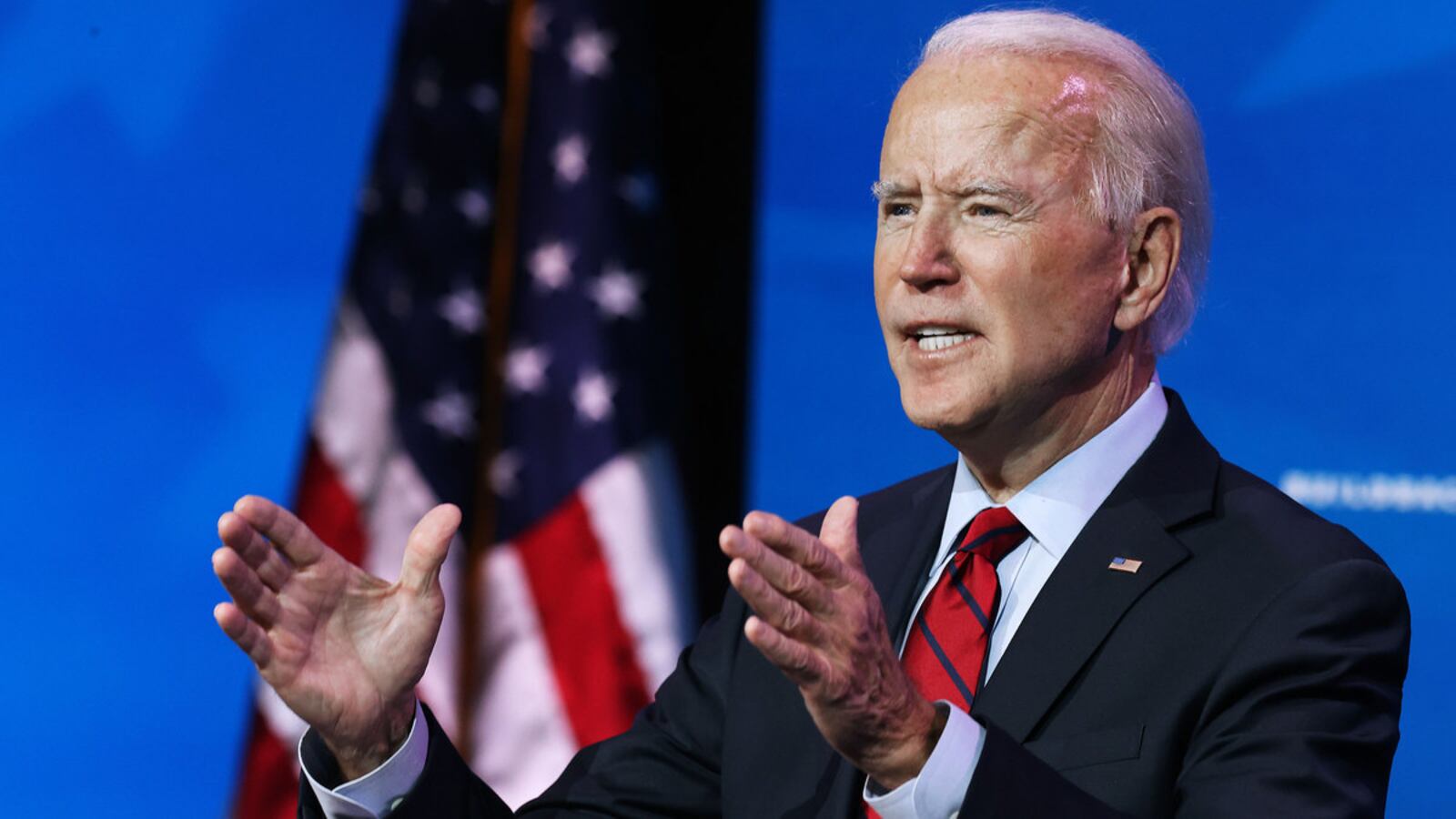One month out from the first primary contest of the 2020 cycle, the Democratic Party was in disarray, again.
For months, the party’s two dozen presidential hopefuls had grown more and more divided over whether defeating President Donald Trump required a restoration of past small-d democratic norms, or a wholesale rebuilding of the system that had allowed him to be elected. Every presidential debate had begun with a 20-minute knockdown dragout over universal health-care coverage versus a single-payer system. Even the rules about who qualified to be present on debate stages were a topic of furious debate.
And Joe Biden was straddling those divides, calmly calling for consensus.
“Folks, we need a president who can bring the country together, a leader who can not only unite our party, but also who’d want to unite the country,” Biden told potential supporters in a former Maytag factory in Newton, Iowa, in late January. “We’re a democracy—democracies depend on consensus. There's no way to govern without reaching a consensus. Nothing happens, other than the abuse of power, when there’s no consensus.”
Nearly one year later, Biden is about to take the reins of a country ruptured along partisan and ideological lines to a degree extreme even by the standards of the Trump era.
Now, Democrats are raising questions about whether Biden’s continued call for consensus will be a salve for a fatigued nation exhausted from the partisan rancor of a “grim era,” or if it’s an old-school misadventure that spells the undoing of an ambitious legislative agenda.
“President-elect Biden comes from a time when the Senate still worked, when compromise was possible and cutting deals wasn’t a dirty word,” said Jim Manley, a Democratic strategist with more than two decades of experience on Capitol Hill. “The problem now is that in this hyper-partisan environment everything is picking at things from the get-go and that makes deals that much more difficult.”
Biden’s decades-long career in politics—and the successful pitch he made to voters as a presidential nominee—is defined by his storied ability to wrangle a vast group of senators to pass legislation like the Violence Against Women Act and the 1994 crime bill, both of which are of a scale and scope rarely enacted in modern Washington.
Part of that fondness for consensus-building is just in the way that Biden is wired, one former longtime staffer said.
“He was always so receptive to new and interesting ideas and being creative about ways that you could sort of use the power of the chairmanship at Foreign Relations or Judiciary,” the staffer said, noting that Biden was consistently curious about new—or new to him—solutions to policy problems, whether they came from staffers or Republican colleagues. “I’d almost call it a creative impulse, his desire to create this amalgam legislation that could bring as many people onboard as possible.”
But the Capitol Hill of the 21st century is less an intellectual policy playground than a low-budget reboot of Celebrity Deathmatch, and Biden’s past pushes for the most expansive consensus possible to pass ambitious legislation has also been criticized for helping hinder major Democratic priorities.
Case in point: the Obama administration’s misfire on gun legislation following the Newtown school massacre.
After the 2012 attack on an elementary school in Newtown, Connecticut, when a mentally ill man killed 26 people, including 20 young children, Biden was tasked by President Barack Obama with helming the most aggressive push for gun reform in decades. Obama, who by that time had overseen the response to several of the deadliest mass shootings in American history, was mindful of the limited shelf life of political will to act.
“I would hope that our memories aren’t so short that what we saw in Newtown isn’t lingering with us, that we don’t remain passionate about it only a month later,” Obama said in the White House briefing room days after the shooting, when he announced that his administration would send far-reaching proposals to Congress in order to prevent more tragedies in the future—and tasked Biden with steering the effort.
Biden, an expert in Senate legislative negotiations whose landmark crime bill in 1994 included a ban on the sale of many types of assault weapons, was seen as the best person to navigate a political climate wherein the power of the gun lobby had reached unprecedented influence on Capitol Hill.
But the attempt failed, in part, according to another former Senate staffer, because Biden belabored his efforts to meet with hundreds of groups and individuals involved in the gun control debate, from manufacturers to law enforcement to parents’ groups and labor union leaders, as well as recalcitrant former colleagues who ended up more afraid of the gun lobby than of Biden.
“I don’t want to say ‘wasted’... but he spent a lot of political capital and a lot of time trying to win over Tom Coburn [of Oklahoma], who had literally held up legislation to improve background checks after Virginia Tech,” the former aide said, in reference to what was then the deadliest mass shooting in American history. “And when you’re talking gun legislation, of any type, the window after a tragedy like Sandy Hook is just too small.”
Part of that, the staffer felt, was rooted in Biden’s indefatigable belief in the politics of consensus, which he felt was on his side at the time.
“There’s a generic consensus—not unanimity—a consensus that is different than existed when I did this back in 1992 and 1993 to get to the ‘94 (crime) bill,” Biden said in Danbury, Connecticut, two months after the shooting. “The consensus is emerging. There’s a consensus on the types of action everybody thinks are reasonable we should take.”
But the tight window for passing major legislation to address a current crisis is often the enemy of that kind of consensus-driven lawmaking.
“That often involved taking time to let the process play itself out,” Manley said. “Things didn’t just come together naturally. The smart people knew you had to let things gel.”
But others see Biden’s desire to bridge the divide between Republicans and Democrats on the Hill as the last, most genuine attempt by a politician who came up in the Age of Consensus to restore the version of Washington that occasionally got big things done.
“In my experience with him, I’ve seen him apply that premise of finding good individuals to build consensus, to get things done,” Delaware state Sen. Darius Brown, a former project assistant in Biden’s Senate office who helped manage his domestic portfolio, told The Daily Beast, summing up a lesson he first learned in Biden’s office. “No matter the individual that’s elected, that’s a colleague of yours—recognize that there is an electorate that saw something good in them, and elected them, so it is your responsibility to find that good.”
Brown credited that lesson—and advice from Biden once he became an elected official himself—with helping him pass expansive expungement legislation in Delaware, where the state House of Representatives was under Republican control for decades until relatively recently.
“He, better than anyone else, has the ability and the relationships to actually get it done,” Brown said. “It is those that he served with for 40 years in the U.S. Senate, it is those that he established relationships with while vice president… those relationships are important. If anyone can do it, it’s him.”
Whether Senate Majority Leader Mitch McConnell (R-KY) has any interest in revisiting that relationship, however, remains to be seen. Nearly six weeks after the election, McConnell this week finally admitted that Biden is, in fact, the president-elect, which actually sets him at a faster pace to accepting reality than many of his Senate colleagues, and Biden, for his part, clearly forecasts the possibility of a productive relationship.
“As Donald Trump’s shadow fades away, you’re going to see an awful lot of change,” Biden said in a call with supporters on Monday, allowing that he might “eat these words” eventually. “I know I’ve been criticized heavily for saying from the beginning [that] we’ve got to unify the country. I think you’re going to be surprised. It’s going to take six to eight months to get it under way, but I think you’re going to be surprised.”
But if the kind of outsized butthurt that Republicans are already showing in regards to Biden’s election—especially to nothingburgers like Biden’s future deputy chief of staff, Jen O’Malley Dillon, calling them “fuckers,”—is any demonstration, the Republican Party’s view of comity is going to be, well, narrower.
“This says volumes about her boss who calls for ‘unity,’” White House press secretary Kayleigh McEnany said in response to that particular non-controversy. “They think we are deplorable, irredeemable ‘F***ers.’ SICK‼️”






